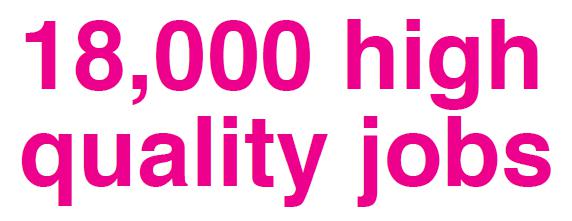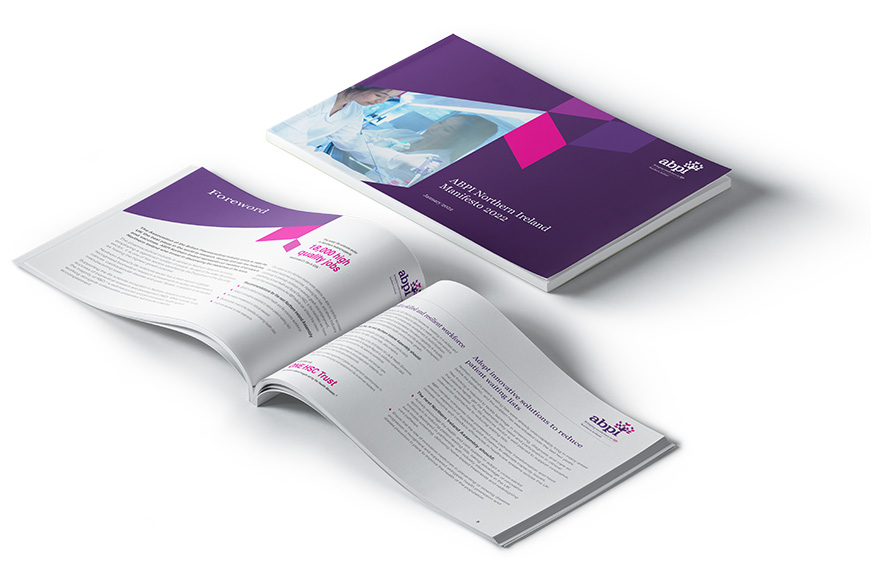Our Northern Ireland Manifesto 2022
The Association of the British Pharmaceutical Industry exists to make the UK the best place in the world to research, develop and use new medicines and vaccines. ABPI Northern Ireland represents our members of all sizes in Northern Ireland who invest in discovering the medicines of the future.
The pharmaceutical industry is central to Northern Ireland’s economy, employing a significant number of people. As part of the wider life sciences sector, it is one of five sectors identified by the Department of the Economy as having the highest growth potential.
Northern Ireland’s life sciences sector has a track record of globally recognised biomedical research achievements including developments in cancer, cardiovascular disease and cystic fibrosis, in addition to its valuable manufacturing base.
Supporting the life sciences ecosystem in Northern Ireland is critical to the success of biomedical research and development (R&D). Whilst industry funds the majority of R&D,2 a well-resourced and pro-innovation health system working alongside collaborative universities will ensure collective accomplishment.
Our vision is for a Northern Ireland where patients are able to quickly access the latest medicines and vaccines, improving their lives, and where Industry continues to positively contribute to economic growth and employment, partnering across Health and Social Care (HSC). In this manifesto we have set out five recommendations the ABPI believe can achieve this vision.
Recommendations for the next Northern Ireland Assembly
- Build a skilled and resilient health and life sciences workforce
- Adopt innovative solutions to reduce patient waiting lists
- Increase investment in clinical research
- Build public trust in the benefits of sharing health data
- Improve access to new treatments

The wider life sciences sector in Northern Ireland supports 18,000 high quality jobs and over £1.1bn in GVA.1

ABPI Northern Ireland Manifesto 2022
Our vision is for a Northern Ireland where patients are able to quickly access the latest medicines and vaccines, improving their lives, and where Industry continues to positively contribute to economic growth and employment, partnering across Health and Social Care (HSC). In this manifesto we have set out five recommendations the ABPI believe can achieve this vision.

Build a skilled and resilient workforce
As reflected in the 2021 Elective Care Framework, investing in a skilled and well-resourced workforce is critical to delivering a health and care service ‘fit for all’. Investing in life sciences skills development to build Northern Ireland’s clinical research and biomedical innovation capability is equally important to create an interconnected health and life sciences ecosystem that will improve both population health and economic growth.
To do this, the next Northern Ireland Assembly should:
Focus on local strengths and skills attainment particularly in diagnostics, big data, clinical trials, data analytics.
Re-evaluate the findings of the 2015 Matrix NI Life & Health Sciences Capability Assessment & Foresight Report to address current skill deficits and future-proof the life sciences workforce.
Invest in training in research across health and social care, and introduce programmes to encourage peer networks of research-active healthcare professionals.
Create a central programme of global development opportunities to attract and retain emerging and established life sciences leaders.
In Q2 2020, only disease prevention in plans to improve the health of the population. ONE HSC Trust met cancer referral targets set by the Health Minister.3
Adopt innovative solutions to reduce patient waiting lists
Northern Ireland’s patient waiting lists were already unacceptably long in many areas before the pandemic, and the problem has exacerbated over the last two years.
New thinking is required to tackle backlogs in screening, diagnosis and care so that patients rapidly get the treatments they need and participation in clinical research is increased. The life sciences sector is well placed to support innovative, cross-sector approaches to reducing waiting lists.
ABPI member companies have pioneered care pathway transformation and have extensive experience of supporting pilot schemes to alleviate capacity issues, increase resource and introduce efficiencies in healthcare systems across the UK.
The next Northern Ireland Assembly should:
Actively encourage the health and care system to adopt a cross-sector approach to reducing patient waiting lists, taking advantage of innovative solutions developed in partnership with industry elsewhere in the UK such mobile screening, delivering home-based treatments and redesigning care pathways.
Ensure that the role of innovative medicines in preventing or slowing disease progression is recognised and supported alongside health promotion and disease prevention in plans to improve the health of the population.
Increase investment in clinical research
Clinical research is essential to the development of new medicines and vaccines, bringing benefits to patients, Health and Social Care and the economy. £1 of public funds invested in research brings a return of £4.14.4
Yet Northern Ireland invests just £8 per capita from public funds into research every year - about half as much as the rest of the UK. leaders must reduce this imbalance as a priority to attract and retain Northern Ireland’s brilliant clinical academics and life sciences leaders, many of whom have already delivered world-leading breakthroughs.
The next Northern Ireland Assembly should:
- Increase investment in clinical research to a level of parity with other UK nations as a priority.
- Ensure that health and social care research capacity is protected and developed as part of overall workforce planning, to avoid trials having to being halted due to care pressures.
- Encourage Trusts to develop new approaches with industry to improve inclusivity and diversity in clinical research participation, such as homebased trial delivery, data gathering and monitoring.
- Continue to support the Department of Health in delivering on the commitments of the UK-wide vision for clinical research delivery.
Based on findings from England, patients receiving care in research active hospitals have improved outcomes and improved survival rates 5 and research-active trusts also better manage the treatment and care of patients, resulting in a better patient experience. 6
Building public trust in the benefits of sharing health data
Analysing health data has the potential to transform the way disease is treated and diagnosed, but the right infrastructure is needed to make this a reality. The information collected by HSC – on family and medical history from birth, primary and secondary care, treatment responses and outcomes – already has the potential to help understand, predict, prevent and treat diseases.
When digitised through the £300m Encompass programme, these data assets also have the potential to identify behavioural risk factors and target areas of high health inequalities. The ability to track outcomes and optimise patient care is essential if we are to create a sustainable, innovative healthcare system in NI.
Industry can help with this process. ABPI members excel in developing and utilising data analytic tools with the capability to capture, interrogate, analyse and standardise data. The next NI Assembly should therefore:
- Allocate dedicated funding to the digitisation of the health service as a priority of equal importance to waiting list reductions and workforce capacity building.
- Create a cross-sector health data steering group with the Digital HSC Team to build public trust in use of health data for research purposes .
- Develop regulations emerging from the 2016 Health and Social Care (Control of Data Processing) Bill to facilitate secondary use of health data. This will facilitate effective planning of services, improvements in diagnosis and treatment, and evaluation of the impact of health and care transformation.
Improve access to new treatments
It is critical that patients in Northern Ireland can get access to the latest medicines and vaccines. In Northern Ireland we need to do more to make sure patients can access treatment consistently across all five Trusts and in line with UK counterparts.
Currently in Northern Ireland an additional minimum 19-week delay exists between a medicine being routinely commissioned for use compared to England.
Prescribing patterns of medicines differ significantly across Northern Ireland understanding the reasons behind local variation would improve medicines optimisation and reduce medicine wastage.
The next Northern Ireland Assembly should therefore:
- Ensure that the commissioning process is properly resourced.
- Encourage the new Area Integrated Partnership Board to accelerate access to innovative treatments for everyone, rather than increasing local variation.
- Make use of the 2019 Voluntary Scheme for Branded Medicines Pricing and Access (VPAS) in a similar way to the Scottish government who ring-fence this money through their New Medicines Fund. This Fund provides health boards with financial support to enable patients to access the latest innovative treatments.
Recommendations for the next Northern Ireland Assembly
- Build a skilled and resilient health and life sciences workforce
- Adopt innovative solutions to reduce patient waiting lists
- Increase investment in clinical research
- Build public trust in the benefits of sharing health data
- Improve access to new treatments
Ensuring Northern Ireland has a thriving health and life sciences ecosystem is central to supporting our health and economic growth. The aspiration should be not just to keep pace with our neighbours. Our health and life sciences potential is far greater than that.
By Investing in workforce, care delivery, research, health data and making sure patients have rapid access to innovative treatments, Northern Ireland can become a pro-innovation, connected place of opportunity - with a healthier population and significantly greater ability to attract life sciences investment and deliver economic growth.
Commissioning and implementation of National Institute for Health and Care Excellence (NICE) Technology Appraisals is slower in NI than in England and Wales due to Departmental reviews.7
VPAS - an agreement between the ABPI and the DHSC on behalf of all four nations. This ensures growth in the branded medicines bill is controlled through an industry rebate. In Northern Ireland this industry rebate totalled £33.7m in 2019.
This scheme strikes a balance between supporting innovation in the pharmaceutical industry, helping to get the most cost-effective medicines to patients as quickly as possible, and ensuring complete predictability on spend for the entire branded medicines bill.
References
- https://www.abpi.org.uk/publications/contribution-of-the-pharmaceutical-sector-to-northern-ireland-s-economy/
- https://www.economy-ni.gov.uk/articles/research-bulletins
- https://www.health-ni.gov.uk/sites/default/files/publications/health/hs-niwts-cancer-waiting-times-q1-21-22.pdf
- https://research.hscni.net/sites/default/files/evaluation-hsc-rd-final-report-june-2012.pdf
- Downing A, Morris EJ, Corrigan N, Sebag-Montefiore D, Finan PJ, Thomas JD, et al. High hospital research participation and improved colorectal cancer survival outcomes: a population-based study. Gut. 2017;66(1):89–96.
- Jonker L, Fisher SJ, Dagnan D. Patients admitted to more research-active hospitals have more confidence in staff and are better informed about their condition and medication: Results from a retrospective cross-sectional study. J Eval Clin Pract. 2020;26(1):203–8f
- https://niformulary.hscni.net/managed-entry/
Last modified: 20 September 2023
Last reviewed: 20 September 2023